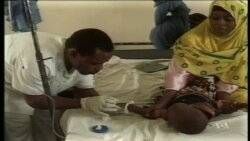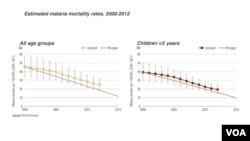Malaria is a disease that kills more than 600,000 people every year. It debilitates even more. Each year on World Malaria Day, we take stock of the disease, what’s been done to contain it, and what still needs to be done.
Children are the most likely victims of malaria. They live in Latin America and Asia, but mostly in sub-Saharan Africa where the most deadly strain of the disease is found.
Dr. Anthony Fauci heads the infectious diseases division of the U.S. National Institutes of Health.
"About every 60 seconds a baby dies from malaria; usually a baby living in sub-Saharan Africa," said Fauci.
Survivors may suffer permanent brain damage, epilepsy, blindness or hearing loss.
-About 3.3 billion people, half the world's population, are at risk of malaria
-People living in the poorest sub-tropical and tropical countries are the most susceptible
-Caused by mosquito-borne parasite
-Killed 627,000 people in 2012, mostly African children
-Kills by restricting blood flow to vital organs
-Symptoms include fever, headache and vomiting
Source: WHO
Mosquitoes don't cause malaria. But a certain type - the anopheles mosquito - can transmit a parasite that does. And someone with malaria then can pass the parasite on to uninfected mosquitoes and the cycle continues.
Dr. Peter Agre at The Johns Hopkins University says malaria is a disease of the poor.
"They're sick because they're poor and they're poor because they're sick," said Agre.
Dr. Agre heads The Johns Hopkins Malaria Research Institute. He says developed countries rid themselves of malaria by draining swamps, using screens on porches, and constructing buildings in higher elevations where mosquitoes that carry the parasite don't live. People in poor countries can't do that.
A new push to contain malaria is under way. Funds for bed nets, insecticide spray, testing and medicine to treat malaria have cut the death rate from malaria by as much as 50 percent. Dr. Agre says much more needs to be done. “At The Johns Hopkins Malaria Institute, scientists work on many aspects of the malaria problem. The mosquitoes are one part of that, and one of our most successful areas of research," he said.
Researchers are trying to change the mosquito so it can't transmit malaria. Dr. Fauci says other research involves developing new medicines and a vaccine.
"We have been frustrated over many years of not having a highly effective vaccine against malaria," he said.
Along the Thai-Cambodian border, drugs used to treat malaria take longer to work. That's generally the first sign the parasite has developed drug resistance. If it spreads, researchers predict millions of people will die.
"The real critical thing that we’re hoping for is with a combination of treatment, combination of prevention like bed nets and others, and a combination of a good vaccine, that some day, we can’t predict when, we may be able to eliminate malaria and essentially eradicate it," said Fauci.
This would help the world's poorest children, their families and entire countries.
Children are the most likely victims of malaria. They live in Latin America and Asia, but mostly in sub-Saharan Africa where the most deadly strain of the disease is found.
Dr. Anthony Fauci heads the infectious diseases division of the U.S. National Institutes of Health.
"About every 60 seconds a baby dies from malaria; usually a baby living in sub-Saharan Africa," said Fauci.
Survivors may suffer permanent brain damage, epilepsy, blindness or hearing loss.
Malaria
Malaria-About 3.3 billion people, half the world's population, are at risk of malaria
-People living in the poorest sub-tropical and tropical countries are the most susceptible
-Caused by mosquito-borne parasite
-Killed 627,000 people in 2012, mostly African children
-Kills by restricting blood flow to vital organs
-Symptoms include fever, headache and vomiting
Source: WHO
Dr. Peter Agre at The Johns Hopkins University says malaria is a disease of the poor.
"They're sick because they're poor and they're poor because they're sick," said Agre.
Dr. Agre heads The Johns Hopkins Malaria Research Institute. He says developed countries rid themselves of malaria by draining swamps, using screens on porches, and constructing buildings in higher elevations where mosquitoes that carry the parasite don't live. People in poor countries can't do that.
A new push to contain malaria is under way. Funds for bed nets, insecticide spray, testing and medicine to treat malaria have cut the death rate from malaria by as much as 50 percent. Dr. Agre says much more needs to be done. “At The Johns Hopkins Malaria Institute, scientists work on many aspects of the malaria problem. The mosquitoes are one part of that, and one of our most successful areas of research," he said.
Researchers are trying to change the mosquito so it can't transmit malaria. Dr. Fauci says other research involves developing new medicines and a vaccine.
"We have been frustrated over many years of not having a highly effective vaccine against malaria," he said.
Along the Thai-Cambodian border, drugs used to treat malaria take longer to work. That's generally the first sign the parasite has developed drug resistance. If it spreads, researchers predict millions of people will die.
"The real critical thing that we’re hoping for is with a combination of treatment, combination of prevention like bed nets and others, and a combination of a good vaccine, that some day, we can’t predict when, we may be able to eliminate malaria and essentially eradicate it," said Fauci.
This would help the world's poorest children, their families and entire countries.






